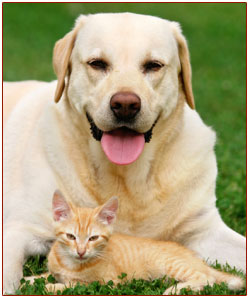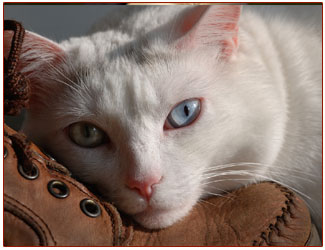Grieving the Loss of a Pet
 Your pet is a member of your family, and it is normal for the loss of a pet to trigger feelings of grief and sadness, much like when a human family member dies.
Your pet is a member of your family, and it is normal for the loss of a pet to trigger feelings of grief and sadness, much like when a human family member dies.
These intense feelings of loss may surprise you. It may trouble you to have such strong emotions for a pet. But the loyal companionship and unconditional love that pets provide give them a unique place in your life and it is natural to grieve over such a loss.
Coping with that grief can be difficult. The loss of a pet can lead to sleeping disorders, weight loss, tiredness or difficulty focusing. You may find yourself dealing with the death of your pet in unexpected ways. Here are some tips to help you through the grieving process.
Allow Yourself to Grieve
First, accept that grieving for a pet is normal. Give yourself time to grieve. Each person responds to loss differently—crying, sharing reminiscences or reaching out for comfort are all ways to cope with the loss of a pet. It may take many weeks or months to go through the grieving process. No matter how long it takes, give yourself the time and opportunity to express your emotions.
Unfortunately, it is common that friends and family may not fully understand your loss. In such cases, it might be helpful to turn to a support group, counselor or other resource to help cope with your grief.
What are the Stages of Grieving?
 There are five stages of grief that most people typically go through, whether they are mourning the loss of a pet or a human family member. You may experience each one in sequence, or you may only pass through a couple of the stages. Recognizing the stages of grieving does not make them disappear or easier to go through, but it does provide some comfort to know that others have shared similar experiences.
There are five stages of grief that most people typically go through, whether they are mourning the loss of a pet or a human family member. You may experience each one in sequence, or you may only pass through a couple of the stages. Recognizing the stages of grieving does not make them disappear or easier to go through, but it does provide some comfort to know that others have shared similar experiences.
1. Denial is a natural response to the shock of death. The more your pet has been a part of your life, the harder it can be to imagine life without him or her. Dealing with the realities of death can be much more difficult if you suppress your feelings of grief and loss.
2. Anger includes all of your expressions of unhappiness about the situation. When anger is accepted and expressed safely, it can motivate action. If you get stuck in blame, guilt or bitterness, your anger can be destructive.
3. Bargaining includes your attempts to remain in control. Sometimes bargaining can be unrealistic—for example, you may pledge to attend religious services or participate in volunteer work if you could have your pet back.
4. Depression is the psyche's attempt to muffle the feelings of loss. Extreme sadness is often mixed with doubts and fears about the meaning and nature of life. Depression includes feelings of hopelessness and overwhelming sorrow. Your energy level can drop swiftly, making it difficult to do daily tasks or maintain a healthy life-style.
5. Acceptance comes when you can finally feel and integrate all the feelings of loss: powerlessness to prevent death, loss of identity, sadness, gratitude, joy, hope, and anger. Having faced loss, you appreciate life more and are able to learn from your experience.
What is the Best Way to Remember My Pet?
People choose to remember their pets in a variety of ways. Some have a funeral for their animal companions, while others create a scrapbook or other similar keepsake. Other ways to honor your pet include donating to a humane society or animal rescue organization in your pet's name; creating a memorial at home, or sharing stories and memories about your pet with friends and family.
Should I get a New Pet Right Away?
Pets are not interchangeable, and while it may be tempting to fill the void of your loss by purchasing a new pet, it is often best to wait until you have finished mourning. When you do make the decision to purchase a new pet, remember that this new pet will not be the same. His or her personality and behavior will be different, and it is unfair to compare the two pets. This may mean choosing another type of pet or different breed. Follow your instincts in whatever decision you make. You will know when the time is right to bring a new pet into your life.
How Will My Other Pets Deal with This Loss?
 Pets often form strong attachments to one another, and a surviving pet will notice the absence of his or her companion. An animal that has experienced the loss of a friend may react in a way similar to you. Your other pet may show signs of depression: tiredness, loss of appetite, lack of interest in favorite activities and so on. If this is the case, give your pet more attention and affection. Engage in a favorite activity, invite human friends your pet likes for a visit and hide toys and treats in his or her favorite spots to find during the day. Like you, it may take a while for your pet to adjust to the loss. Time is the one thing that may help.
Pets often form strong attachments to one another, and a surviving pet will notice the absence of his or her companion. An animal that has experienced the loss of a friend may react in a way similar to you. Your other pet may show signs of depression: tiredness, loss of appetite, lack of interest in favorite activities and so on. If this is the case, give your pet more attention and affection. Engage in a favorite activity, invite human friends your pet likes for a visit and hide toys and treats in his or her favorite spots to find during the day. Like you, it may take a while for your pet to adjust to the loss. Time is the one thing that may help.